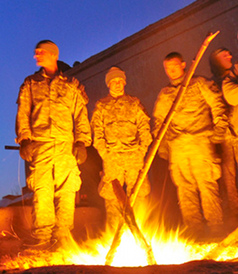 US Army Soldiers gather around a fire to stay warm during an operation in Helmand province, Afghanistan in February of 2010.US at War Since 1950: A New Year's Meditation
US Army Soldiers gather around a fire to stay warm during an operation in Helmand province, Afghanistan in February of 2010.US at War Since 1950: A New Year's MeditationBy Micheal True
Saturday 01 January 2011
"The same war continues," Denise Levertov wrote in her poem, "Life at War." Her lament is even more appropriate for 2011 than it was when she wrote the poem forty-five years ago.
Columnists and academics, including international relations professor Andrew Bacevich of Boston University, are finally acknowledging facts familiar to anyone "awake" regarding failed US policies, wasted lives and wasted resources during this period. Willfully ignoring such facts, as Bacevich wrote, "is to become complicit in the destruction of what most Americans profess to hold dear."
At the beginning of the new year, consequences of "life at war" stare us in the face: the victimization of military and civilian populations and a huge national debt, including an annual military budget that is larger than all military budgets in the world combined and includes $5 billion that remains unaccounted for in Iraq, as well as aid to Pakistan that has wound up in the hands of the Taliban.
These truths haunt any citizen who has lost loved ones in prolonged wars in Korea, Vietnam, Iraq or Afghanistan since 1950, or in disastrous interventions in Iran, Guatemala, Indonesia, Chile, Granada, Panama, Honduras, and so on.
Any responsible citizen acknowledges this painful history in the hope of redirecting US foreign policy in the future. The purpose of reclaiming it is not to open old wounds, but to encourage legislative and direct action committed to peacemaking. It is a call to critique the policies and competence of the Pentagon, the CIA, and the national security apparatus responsible for these disasters.